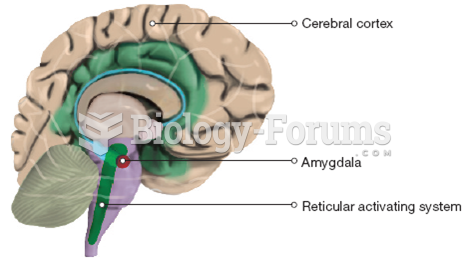|
|
|
Approximately 500,000 babies are born each year in the United States to teenage mothers.
People who have myopia, or nearsightedness, are not able to see objects at a distance but only up close. It occurs when the cornea is either curved too steeply, the eye is too long, or both. This condition is progressive and worsens with time. More than 100 million people in the United States are nearsighted, but only 20% of those are born with the condition. Diet, eye exercise, drug therapy, and corrective lenses can all help manage nearsightedness.
Bacteria have been found alive in a lake buried one half mile under ice in Antarctica.
Approximately 25% of all reported medication errors result from some kind of name confusion.
There are more nerve cells in one human brain than there are stars in the Milky Way.




